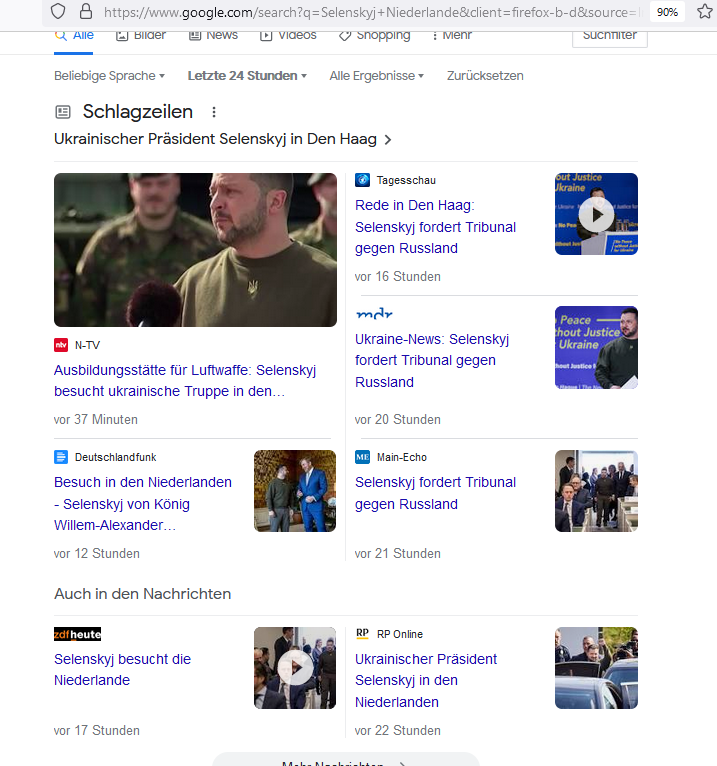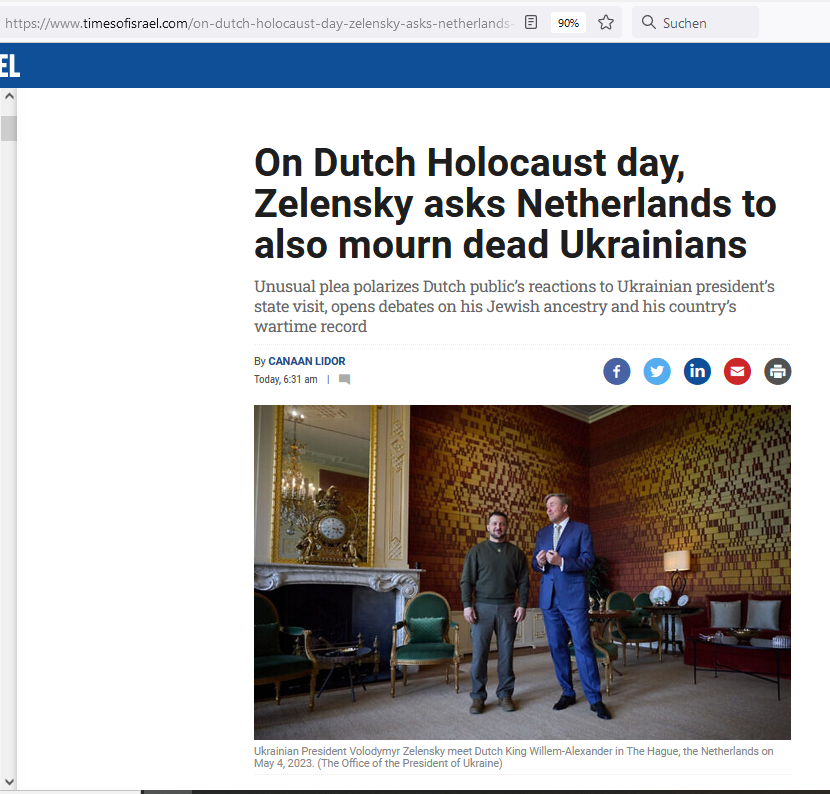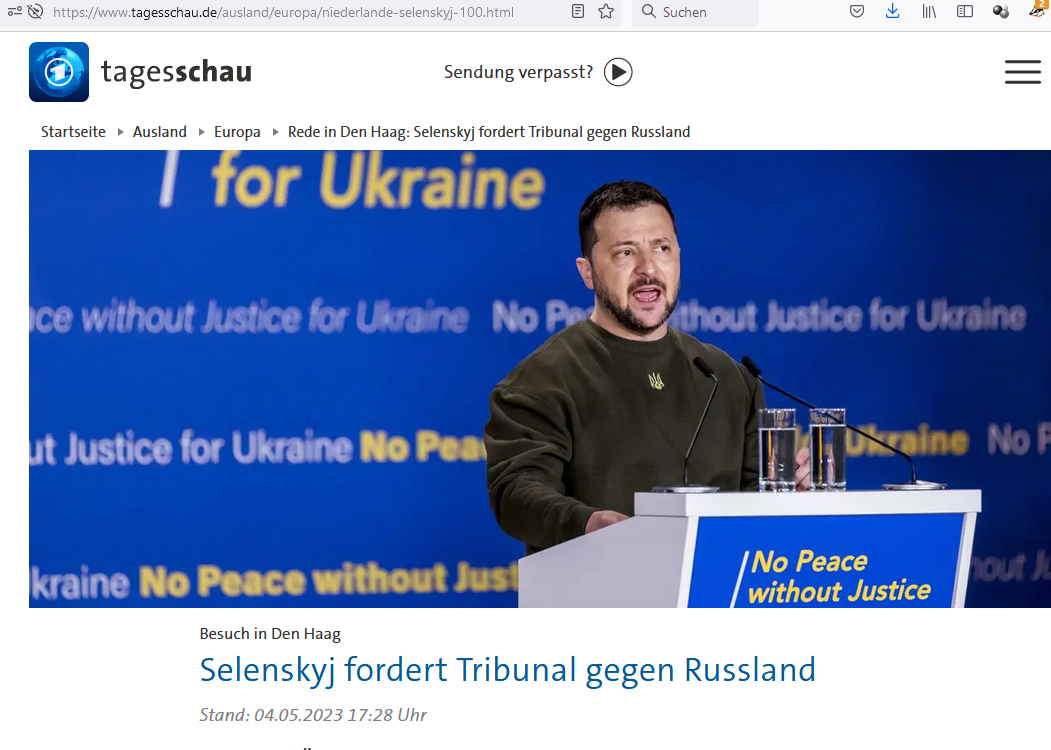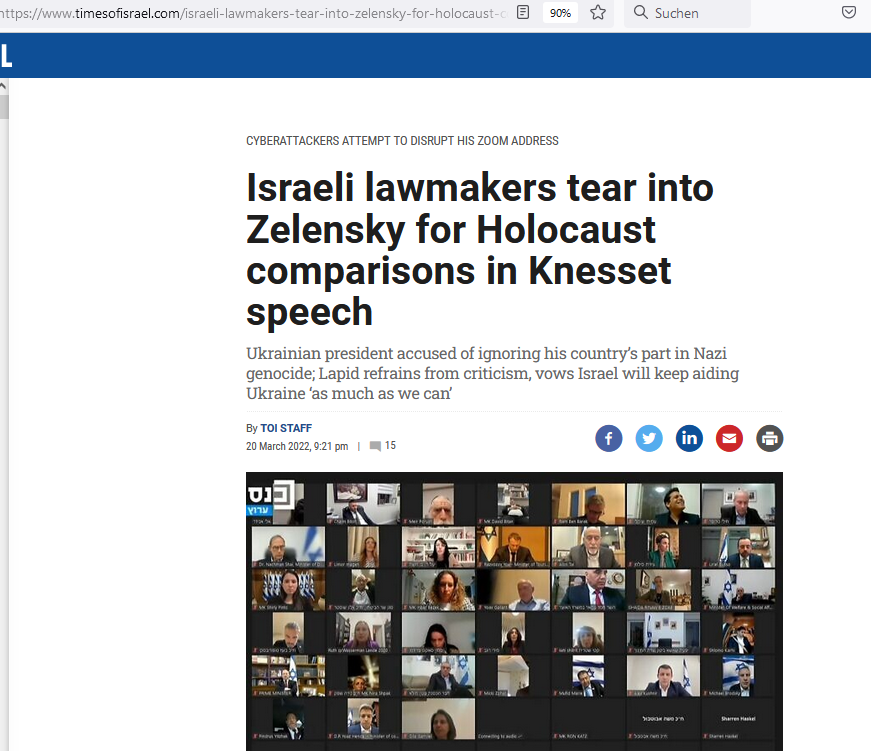By Dr. Clemens Heni, Director, The Berlin International Center for the Study of Antisemitism (BICSA)
25–28 May, 2014, Israel’s biggest and one of the biggest conferences world-wide ever on the topic of antisemitism was held at the Vidal Sassoon International Center for the Study of Antisemitism (SICSA) at Hebrew University, Jerusalem, on the occasion of the retirement of historian Robert Solomon Wistrich. The International Conference was entitled “Anti-Judaism, Antisemitism, Delegitimizing Israel.”
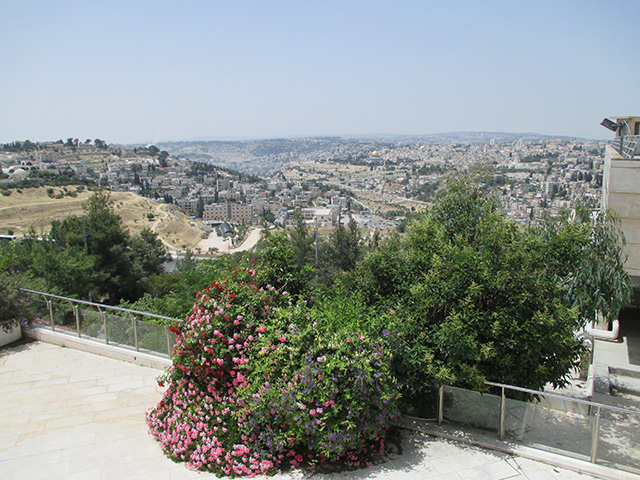
(View from the Maiersdorf Faculty Club over Jerusalem*)
The location was beautifully chosen. From the terrace of the Maiersdorf Faculty Club, where the event was held, one has a stunning view over Jerusalem. On the other side of Mount Scopus, just a five minute walk away at the gorgeous Amphitheatre, one looks out over the Judean Mountains and desert up to the Dead Sea and Jordan.
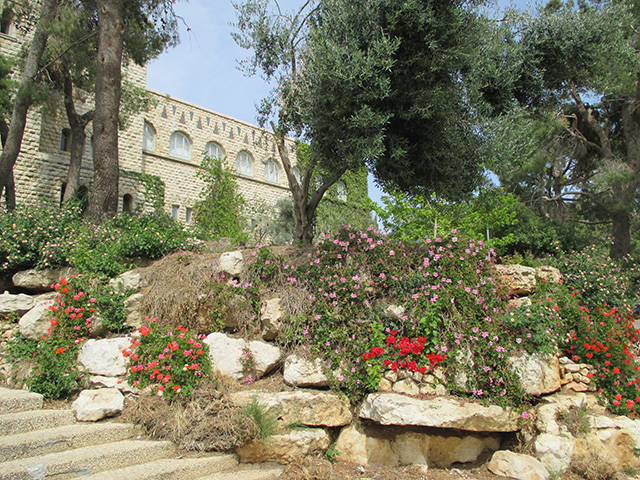
(Hebrew University, Campus, Mount Scopus, Jerusalem*)
Robert Wistrich is the author of 17 books and the editor of 12. His work has been translated in many languages. He published over 350 articles between 1973 and 2011 – you find a complete list of his writings from 1973 through 2011 in the German edition of his Muslim Antisemitism, published in 2011 by Berlin based publishing house Edition Critic.
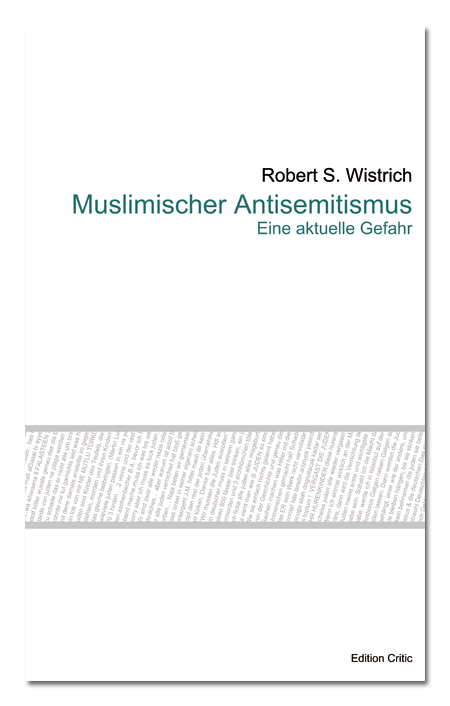
(Prof. Robert S. Wistrich’s German edition of his bestseller brochure from 2002 with the American Jewish Committee on Muslim Antisemitism, published in December 2011 with Berlin based publishing house Edition Critic)
I know of no other scholar who has such a record and continued reflection on antisemitism, the “longest hatred” and “lethal obsession,” as Robert frames it very precisely. His first article was published in 1973 about “Karl Marx, German Socialists and the Jewish Question.”

(Amphitheatre, Hebrew University, Mount Scopus)
Wistrich is known for “stepping back” and looking at the big picture, as he emphasized during his long talk at the conference. He focused on Jewish anti-Zionism, starting with famous Austrian literary critic Karl Kraus. The outstanding nature of Robert’s scholarship became again obvious during his presentation: like almost no one else he is able to jump from 19th century Jewish anti-Zionism and Reform Judaism to Judith Butler and Noam Chomsky’s 21st century Jewish anti-Zionism. He is not drawing direct lines and is very well aware of the differences between Hannah Arendt and Judith Butler, for example. The latter needs the German-Jewish thinker to bolster her own anti-Zionism. Arendt’s criticism of the nation-state, though, is indeed dangerous when it comes to the Jewish state. Still, this might differ from the very outspoken hatred of Zionism known from many Jewish-Austrian thinkers through the 1930s and that of the Butlers, Chomskys or even Finkelsteins of our time.
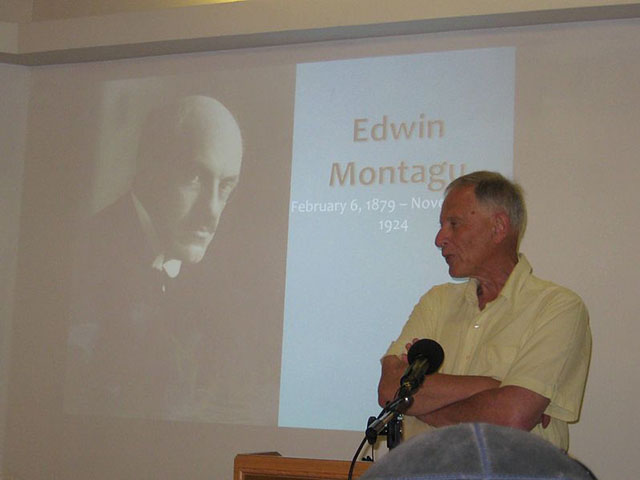
(Prof. Robert S. Wistrich during his presentation at the SICSA conference, Tuesday, 27 May, 2014)
Robert Wistrich dedicated several of his books to his mother Sabina. She made aliyah age 100 in 2010. When asked at Ben-Gurion Airport if she was so fascinated about Zionism to make aliyah at that age, she said: “No, I just want to see the book of my son. That is the reason I came to Israel.” She was thinking of her son’s comprehensive history of antisemitism, A Lethal Obsession. Anti-Semitism from Antiquity to the Global Jihad, a 1184-page volume, published that year.
Robert Wistrich’s research can be put in five categories:
1) The Left and Antisemitism
2) Jewish History
3) Hitler, National Socialism and the Holocaust/Shoah
4) Theories and the analysis of antisemitism and anti-Zionism
5) Muslim antisemitism
Contrary to many, Robert sees Friedrich Nietzsche in the most positive sense of the word as the most anti-German philosopher ever. Nietzsche was not a forerunner of fascism and Nazism. Instead, he embraced the Old Testament and the Jewish “naiveté of the strong heart.” One of the best talks at the huge conference was given by Margaret Brearley (not only because of her wonderful British accent). She dealt with German anti-Jewish esoteric and occult or paganist thinking from Friedrich Schiller through German romanticism and Schopenhauer.
Robert Wistrich was born in April 1945 in Kazakhstan. His father, Jacob Wistreich, a former member of Hashomer Hatzair, was displaced by Stalin (I do intentionally not use the word „deported“ as this means in German to be deported to a Holocaust site). This displacement by Stalin saved his life. Robert Wistrich lost half of his family in the Shoah.
Robert grew up in England, learning Polish, French, then English, German and Hebrew. He also knows or can read and listen to several other languages, including Yiddish, Russian, Ukrainian, Czech, Italian, Spanish, Latin, Dutch, and Arabic. His focus on Jewish history in Habsburg Austria is of tremendous importance. For example, he analyzed in his 1985 study Hitler’s Apocalypse the antisemitism of Hitler, including the time before 1914. Hitler lived in Vienna from 1907 until 1913. I mentioned this during my presentation at the conference, as we are increasingly facing scholars and authors who distort Hitler’s antisemitism. Take Brendan Simms from Cambridge, England, as an example. He argued in 2014 in an article for International Affairs that the First World War made Hitler an anti-English soldier. Only later did he become antisemitic, according to Simms. The same holds for American journalist Jonah Goldberg (National Review Online) who claims that Hitler was a leftist and “socialist” as he writes in his truly troubling and barely scholarly book Liberal Fascism. I emphasized that the notion that Hitler was left is utterly wrong. For example, “German Socialism,” as we call it, was based on private property and capitalism. The core of this “German Socialism” was hatred of Jews and the creation of the “people’s community” or Volksgemeinschaft in German. Hitler was an antisemite and the most far right politician ever. He was not an anticapitalist and not a “man of the left.”
At least in passing I could mention that there were Marxist (and later post-Marxist) pro-Israel scholars. Take Leo Löwenthal, Max Horkheimer, Theodor W. Adorno and Critical Theory as an example. Most pro-Israel scholars and authors in America, the UK, South Africa, Australia and Israel think a priori that Critical Theory is anti-Zionist. That is not the case. But one has to be able to read German to discover the truth behind the origins of Critical Theory, founded in 1937 by Max Horkheimer. He had to struggle with Zionism, but supported Israel. He was aware of the Nasserist and Egyptian threat in the 1950s, for example. I have just published a comprehensive study on the topic of Critical Theory and Israel.
Gershom Scholem, one of the most famous Israeli and Hebrew University professors ever, became a political Zionist by the mid 1930s, turning his back on the “Brit Shalom” period of 1925–1933, based on binationalism and rather cultural Zionism. In my talk, I focused on scholars like Christian Wiese from Frankfurt University who embraces the binational ideology of Hans Kohn. In 2006, Wiese went so far as to quote from one of the most absurd anti-Zionist books so far, Jacqueline Rose’s Question of Zion from 2005. In that book, Rose wrote that Hitler was perhaps inspired to write Mein Kampf and Theodor Herzl to write Der Judenstaat at the very same concert of Wagner music. The problem is that Herzl finished his manuscript in May 1895. Hitler was born in 1889 and was never in France until 1940 when he conquered the country with the German Wehrmacht. Wiese quoted from the very chapter (pages 58–107) in Rose’s book where this antisemitic fantasy of the Hitler/Herzl association by the same taste in music appeared. Finally, I analyzed the scholarly shortcomings of Yale historian Timothy Snyder in his study Bloodlands, which distorts Auschwitz and the Shoah. I also emphasized his close relationship with anti-Zionist Tony Judt. Likewise I criticized Yale’s Seyla Benhabib and her defamation of Israel in 2010. Then, I mentioned troubling tropes in contemporary scholarship in postcolonial studies that distort the history of the Shoah.
At the conference at SICSA there were almost 40 speakers and presentations from four continents (America, Europe, Africa, Asia). Rabbi Abraham Cooper from the Simon Wiesenthal Center in Los Angeles analyzed the shocking new wave of anti-circumcision and anti-kosher-slaughtering discourse all over Europe, including Germany. Tammi Rossman-Benjamin dealt with the BDS (Boycott Divestment Sanctions) movement in California at the huge University of California (state sponsored) educational system. New York’s Ben Cohen with his deep “Alabama” English accent (that remark was funny, as his accent obviously is British) focused on some core features of today’s antisemitism. He distinguishes between historical German “bierkeller” antisemitism and today’s “bistro” antisemitism. Rude agitation and the defamation of Jews as Jews were replaced in many western societies by the more sophisticated version of 21st century anti-Zionist antisemitism. Stephen Norwood showed the overlapping of left-wing and right-wing antisemitism in the United States. He also emphasized that there was significant support in the American Catholic mainstream and the Church during the 1930s and World War II for far-right Jew-hatred like that of Catholic priest Charles Coughlin.
A very few presentations, though, gave several people pause. One speaker said that there is “no Palestinian people” – who, then, should acknowledge the Jewish state, one must ask. Another speaker went so far as to say that the “West Bank is temporarily occupied by the Palestinians.” This was portrayed as supposedly pro-Israel. In fact, it is damaging the Israeli society from within the pro-Israel camp. Prime Minister Benjamin Netanyahu earlier this year said that a future Palestinian state in the territories should think about including Jewish citizens. In fact, since 1948, Israel has some 20% Arab and Muslim citizens as well. Why is everybody a priori thinking of a Palestinian state with no Jews? Today, some 20% Jews are living in parts of the disputed territories. Daniel Pipes wrote about Netanyahu’s “master stroke.” Although I was not able to attend all presentations I did not hear people discussing that idea. This master stroke by Netanyahu includes the acceptance of Jews living in Judea and Samaria and in an Arab state. That would be a signal to the entire Arab and Muslim worlds that Jews are accepted as citizens and are not the “sons of pigs and apes” as the antisemitic discourse in parts of the Arab world always suggests.
Another speaker at the conference said that Norwegian killer Breivik is a criminal, “but” he killed “socialist anti-Zionists and possible future anti-Zionists.” This was shocking not just to me and I left the room soon after.
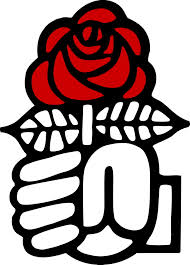
Another speaker stressed that EUrope is already “Islamized” which was a rather racist comment and had nothing to do with a specific criticism of Islamism, Jihad and Muslim antisemitism. One speaker said that Islam as such is the reason for antisemitism and every single (believing) Muslim will become an antisemite sooner or later. Jihadists and Islamists are antisemites today, other Muslims will become antisemitic later. This is of course not the case. Take groups like British Muslims for Israel as an example, among many other pro-Israel Muslims. They are a tiny and oppressed minority in the Muslim community, but they exist. Or look at people like Irshad Manji, known for her modern translation of the Quran. She is pro-Western, pro-Israel and anti-Islamist. The ontologization of Muslims as “the enemy” sooner or later has of course to be rejected.
In addition, I would state: In May 2014, American anti-Islam activist Pamela Geller and her allies started an ad campaign in New York City. They show the Mufti of Jerusalem, Haj Amin al-Husseini, talking to Hitler in November 1941. It is tremendously important to focus on that alliance, indeed. But what does the ad say? On the right side of that big picture one can read “Islamic Jew-hatred: It’s in the Quran”:

This reminds me, sarcastically, of leading Sunni Islamist Yusuf al-Qaradawi. He said in January 2009 on TV that Allah installed Hitler to “punish the Jews.” This Holocaust affirmation is unbelievable. Geller, who is of course pro-Israel and against antisemitism and Jihad, now insinuates that not just the Mufti but also Hitler was inspired by the Quran. The Quran and Islamic Jew-hatred was first and then came Hitler. This is also distorting the history of Islamism as a modern phenomenon in the Muslim world. To claim that today’s Islamist antisemitism is in the Quran – and promoting this ideology with a picture of Hitler – denies or obfuscates the very history of Islamism.
In addition, it also obfuscates the history of Austrian and German modern antisemitism that lead to the Shoah. Islamism is a very modern ideology, as historian and Islamic studies scholar, president of the Middle East Forum (MEF) in Philadelphia, Daniel Pipes, tirelessly emphasizes. Take Hassan al-Banna’s founding of the Muslim Brotherhood in 1928 in Egypt as a kind of starting point for 20th century modern Islamism as a mass movement. Old Islamic Jew-hatred rather resembled Christian Jew-hatred, and is distinct from German eliminationist antisemitism during Nazi Germany and the Shoah. Pipes is also always emphasizing the historical and political difference between Islam and Islamism, take 1798 as a starting point for the demise of the Muslim world and the emergence of Islamist ideology.
Holocaust remembrance is used as a tool to fight the Jewish state. This was a core message of one the most fascinating greeting remarks at the gala dinner at the first evening of the conference by Canadian scholar in law and politician, Irvin Cotler. He is known worldwide for his fight against antisemitism and he is using law to fight Jew-hatred like the incitement to genocide by Iran. Cotler focused on the supposedly well-meaning and for sure more sophisticated anti-Zionist activists of today. They say that the Holocaust was a horrible crime, like South-African apartheid. At this point I ignore the Holocaust distorting aspects of that very comparison or equation, by the way. For liberals in particular Israel has become in some respects the new “Apartheid State” or even “Nazi State.” And here is what Irvin Cotler emphasized: IF Israel is an apartheid state or even a Nazi state people have to fight it. The terms apartheid state and Nazi state are not just meant to defame the entire project of a Jewish state. It calls liberals, leftists and all other people of “good will” to arms, according to Cotler. Anti-Zionist antisemitism is seen by those activists as a form of “anti-fascism.” There is a moral “necessity” to be anti-fascist and therefore today “anti-Israel,” as those people insinuate. Cotler’s vibrant and impressive remarks were a model for the entire conference. People truly feel good to fight Israel as this is seen in their delusional worldview as an act of “anti-fascism.” Cotler grasped and criticized that ideology splendidly.
British legal scholar Lesley Klaff showed the mainstreaming of “Holocaust inversion” in the UK, using the example of the Liberal Democratic Party’s MP David Ward. Since 2010, the Liberal Democratic Party is a coalition partner of the British government under the Conservative Party’s leadership of Prime Minister David Cameron.
Political scientist Matthias Küntzel from Hamburg analyzed the failure of the international community to deal with the antisemitism of Mahmoud Ahmadinejad and the Iranian regime. Meir Litvak from Tel Aviv University also dealt with Iranian anti-Zionist antisemitism. However, Litvak also said that Iran is much more a rational country and not driven by Islamist messianism, as some might think. Esther Webman focused on aspects of the Arab antisemitic discourse, including Holocaust denial. Milton Shain from Cape Town, South Africa, focused on left-wing and Muslim anti-Zionist activism in the former apartheid state.
Historian Laurence Weinbaum from the World Jewish Congress (WJC) in Jerusalem spoke about Polish antisemitism in recent decades and the failure of Poland to deal with its involvement in the Shoah and with its own Jew-hatred before and after 1945. At the end of the day, though, the glass of water is rather “half full” and not “half empty,” Weinbaum said, given the fact that Poland is the first country of the former East Bloc that tries to deal emphatically with antisemitism and its own history, thanks in particular to the scholarship of Jan Tomasz Gross. Sarah Fainberg and Samuel Barnai dealt with Russian antisemitism and anti-Zionism, like far-right groups that embrace Nazi antisemitism and the “8. SS Division Florian Geyer” which has supporters among hardcore antisemitic (and anti-Western) groups in today’s Russia, as Barnai showed in his vibrant talk. Fainberg underlined that it is very difficult to take sides in the current crisis in Ukraine. For sure Russia has to be criticized for its policies, but Ukraine is not just a victim: the conflict is much more troubling. Particularly when it comes to antisemitism, this becomes obvious. In addition one could say: take Stepan Bandera statues and pro-OUN (Organization of Ukrainian Nationalists) propaganda during the uprising this year at the Maidan and in many parts of Ukraine as examples. Russian antisemitism and anti-Western ideology is also very troubling and not every Russian criticism of “fascist” tendencies and antisemitism in Ukraine is necessarily honest in nature, given similar tendencies in Russia which are not condemned by the Kremlin.
French philosopher Shmuel Trigano gave yet another proof of his deep insights in contemporary antisemitic tropes in philosophy, including post-modernism. Trigano frames contemporary antisemitism as disguised as “philosemitism,” which is in fact true. Remember Cotler’s focus on Holocaust remembrance and its abuse by anti-Zionists. Historian Dina Porat underlined the importance of the EUMC working definition of antisemitism. She knows that this was never a legal document. However, it is important, according to Porat, to have a document that states, for example, that comparisons of Israel to Nazi Germany are not criticism of Israel but antisemitism.
One of the highlights of the conference was for sure the talk by Indiana Professor emeritus in Jewish Studies, Alvin Rosenfeld. He dealt with the reactions – today we would say “shitstorm” – on his world-famous brochure “Progressive” Jewish Thought and the new antisemitism from 2006, published by the American Jewish Committee (AJC). In his monograph Rosenfeld analyzed Jewish anti-Zionist thought, including Jacqueline Rose, Michael Neumann and Tony Judt. The New York Times set the pace for the denunciation of Rosenfeld’s masterpiece. Several authors criticized terms and events that Rosenfeld did not even mention in his piece, like the “Iraq War” or terms like “liberals” or “the liberals.”
Finally, there was a small concert for the conference participants at the Botanical Garden at Hebrew University. The four Israeli Irish folk musicians, among them a kind of young Jerusalem version of Paul Simon, gave the participants a wonderful rest. The place was other-worldly, typical Jerusalem stones surrounded by trees and flowers. At some point, a bird joined the concert. Before, the visit of the head of the Catholic Church, Pope Francis I, in the Middle East, could not overshadow the fantastic experience at Mount Scopus.
The entire conference was just possible thanks to the support by the Knapp Foundation, New York, and Charles Knapp, who also gave a powerful greeting address at the very beginning of the event and thanked all participants at the very end of the gathering with an exceptional statement: we, the speakers, shall keep on doing our research the way we do it and the way he witnessed it. This would be like a “thank you” to him…
In addition, Felix and Daniel Posen were supporters of SICSA and the event. I was a happy Felix Posen Fellow of SICSA in 2003 and 2004, after having been a speaker at Robert’s first international conference as new head of SICSA in December 2002.
Many conference participants said that they are looking forward to the future work of the honoree. His focus on the “longest hatred” paved the way for many scholars in recent decades. People who know the current situation among research centers on antisemitism world-wide are aware of the fact that this is an exception from the rule. It was a privilege for all speakers and participants to share their views on antisemitism, anti-Judaism and the delegitimization of Israel with the historian of antisemitism of our time.
However, we have to be realistic. Future generations of scholars even in Israel are not necessarily very much involved in the study of antisemitism. Nor are they known for a vibrant Zionist approach… Time will tell what research in antisemitism will look like in the years to come. Perhaps this conference was the peak of an entire generation or even several generations of scholars in antisemitism, headed by Robert Solomon Wistrich.
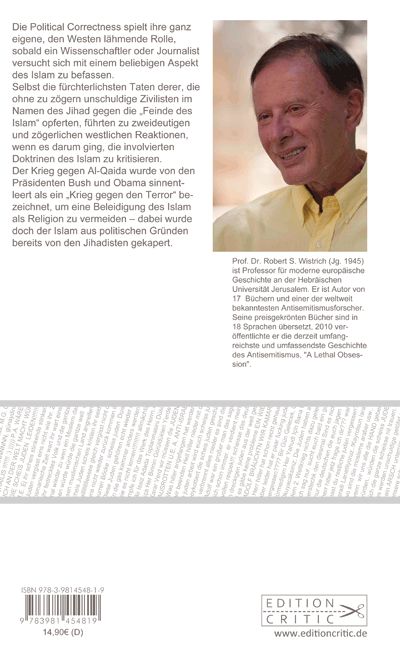
(Backcover of the German edition of Robert S. Wistrich’s Muslim Antisemitism, Dec. 2011)
* Many thanks to Lesley for sharing these pics with me and for her encouragement; as ever, I would like to equally thank Leslie for her editing; finally and in addition, the support and encouragement in recent days by friends and colleagues from around the world was wonderful, thanks so much to Simon, Steffi, Elena, Peter, Thomas, Milton, Jonathan and Neil.

